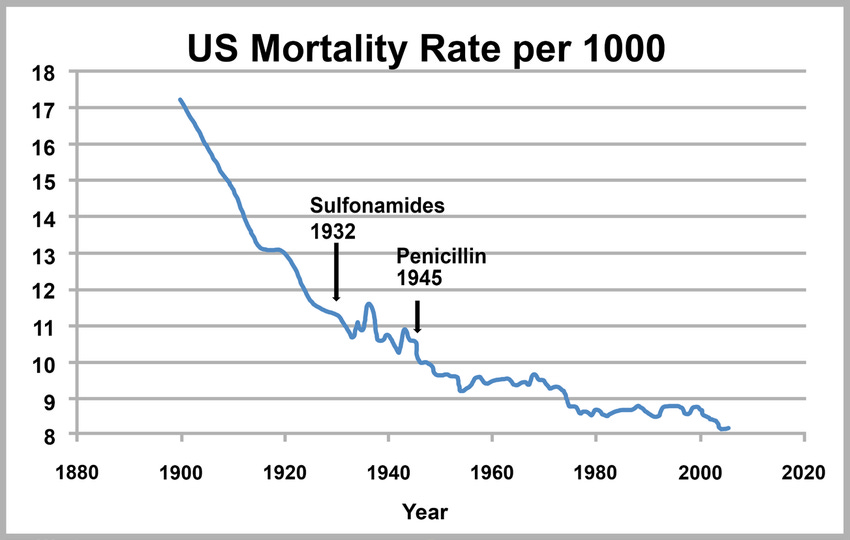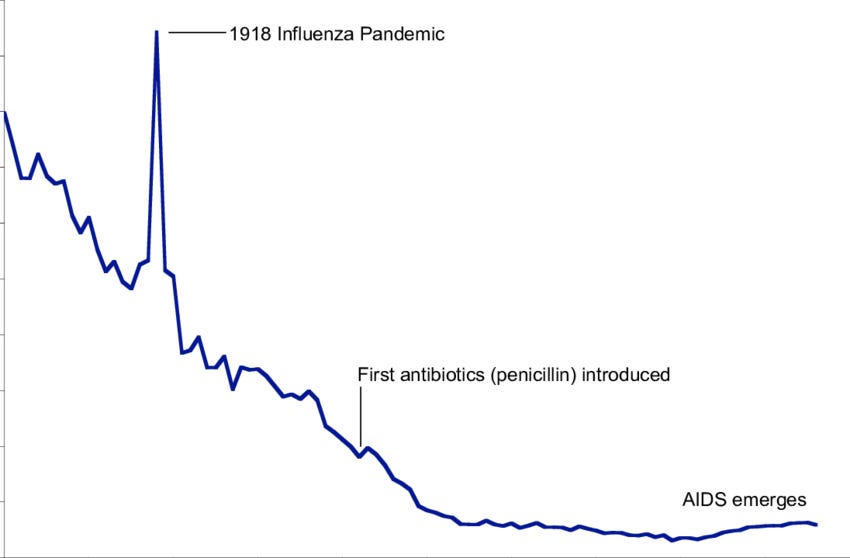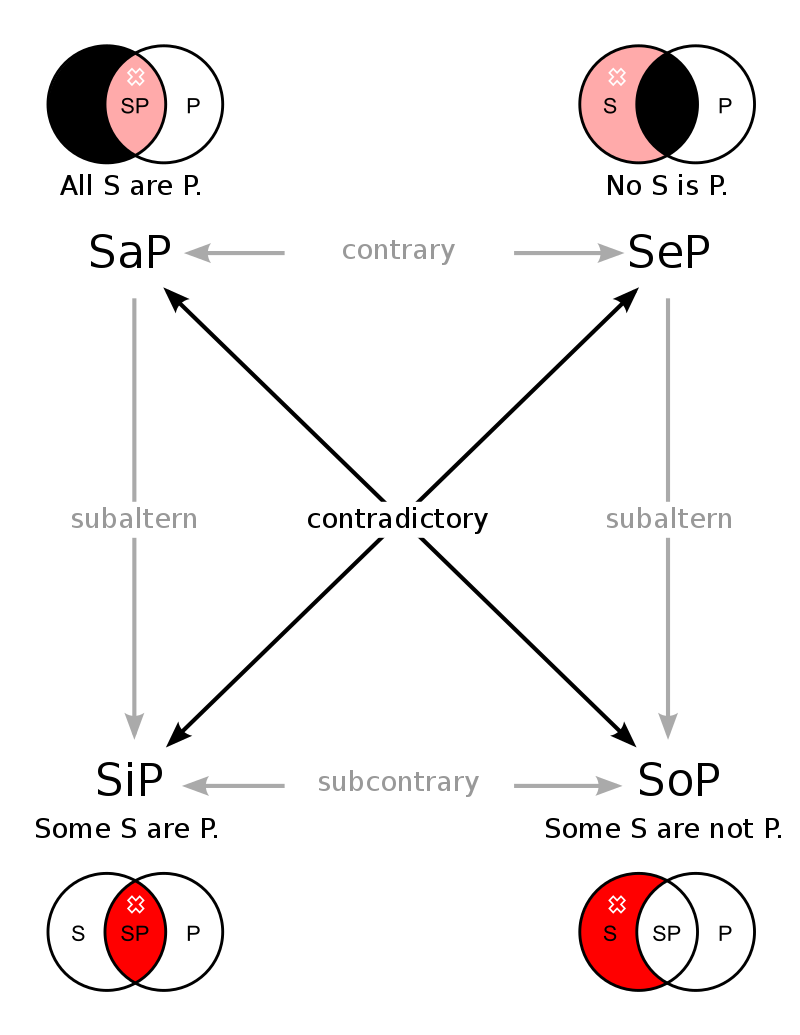Click here for more Healthcare Wars articles. Further discussions are common at the Rounding the Earth Locals channel.
Prior to 2020, I was not paranoid about pandemics, and I had an unresearched "soft skepticism" about a lot of dystopian disaster scenarios portrayed in popular media, but I had never really considered the possibility that pandemics are largely or wholly a form of terrorist propaganda. Even as I began to unravel propaganda about the named COVID pandemic—masking, social distancing, the strange messaging that treating the disease early with simple drugs was somehow bad or meaningless—I was not aware of how cooked and overblown statistics were regarding events such as the Spanish flu.

The lack of any serious mortality bump in the nation where the Spanish flu "pandemic" began in 1918 flatly contradicts the messaging of "50 to 100 million dead worldwide." The fearmongers counter with graphs that isolate "deaths from infectious disease", but if this jump barely reached late-nineteenth century norms and hardly affected the overall mortality rate, the case for existential fear looks flatly like paranoia—perhaps with underlying profit or power motives.

If pandemics really are a constant threat to humanity, how is it that during 2020, 1.3 million Chinese evacuated areas threatened by the potential collapse of the Three Gorges dam, hundreds of thousands migrating in bands by foot, while China suffered a distinct paucity of COVID cases and deaths relative to [all the nations firmly under control of] the West?
Sure, we cannot trust Chinese government statistics. History has repeatedly made that clear enough. And it may very well be that China is an unusual case in being under control by the West, sort of, but in a different way than most nations. But the differential between China and the West with respect to COVID pandemic illness statistics is not at all trivial. We are talking about an order of magnitude in a nation where population density is extremely high—particularly in coastal areas. It seems difficult to justify the notion of a rapidly spreading viral illness everywhere in the world except China under these conditions.
I fully understand the limitations of this brief comparison, but I've had more than a couple of years to mull this over now, so let's take a stroll through history to examine historical conditions that might have produced existential pandemics, but did not.
A Few Additional Common Sense Anecdotes
During the mid-late nineteenth century, China went through a rough period for over a decade that involved a combination of the Taiping Rebellion and the Second Opium War.
In total, perhaps 70 million people or 15% of the population of China perished, depending on whom you trust for such final tallies. The Qing Dynasty was crippled and it was only a matter of time before it fell completely (at the outset of 1912). Through all that nastiness, which we can assume involved the sort of desperation and rampant illness that comes with the horrors of war, nobody ate a bat and spewed COVID into the ports to spread through colonial shipping lanes.
Pandemic negative.
During the British Raj, India suffered a similar catastrophic death toll. As always, estimates vary, but perhaps 30 to 60 million died in what is sometimes called "Victorian holocaust." Whereas the Mughal Dynasty that ruled India until the mid-1800s varied taxation according to harvests, English rule instituted more inflexible taxation resulting in associated mass famine from time to time (Political Routes to Starvation, Dianda, p. 147). Through all of that, and even through the mass migrations of tens of millions of South Asians during the partition of India, nobody ever contracted a disease from an animal that spread through the world or stifled colonial progress.

Pandemic negative.
The exceptional migration during the partition of India may have been the largest in human history, but it's far from the only large migration of vulnerable people. From 1880 to 1915, 13 million Italians left the country in one of the largest mass migrations in history. We do not talk about the Great Pizza Pandemic. African-American slaves, often suffering illness, crossing mosquito-infested lands out of the South and into the North seeking freedom never brought about the Pittsburgh Pandemic.
Barbarian invasions of Rome? Pandemic negative.
Mongol hordes of the Steppes riding animals all over Eurasia? Pandemic negative.
Maybe Genghis Khan was a mask ninja?
History is filled with the graveyards of empires that rose and fell for a variety of reasons. Many of these involved large numbers of dirty, starving people rebelling and burning down the homes of the ruling governors.
In 2019, the History Channel published an article entitled "Pandemics That Changed History", doing their best to make the case that transmissible diseases have struck down civilizations.
Communicable diseases existed during humankind’s hunter-gatherer days, but the shift to agrarian life 10,000 years ago created communities that made epidemics more possible. Malaria, tuberculosis, leprosy, influenza, smallpox and others first appeared during this period.
Incidentally, the History Channel was owned by Maven Media, which was run by James Heckman at the time this article was published. Heckman was the man behind the media outfit that put Robert Malone at the head of the group of dissident doctors at the San Juan Summit in September 2021—before Malone was willing to say that the COVID vaccines should be avoided by everyone, not just children.
Ultimately, the History Channel's article primarily covers events over the past thousand years when bacterial infections wrought havoc within defined locations (not global, as one would rationally think that a "pandemic" implies) due to unsanitary conditions. Such conditions have indeed been a challenge of the development of civilization with more and more complex city development and water management. Thankfully, thoughtful engineers and scientists devised increasingly sanitary systems to solve those problems.
In some of the anecdotes presented, the real problem was lack of simple medical knowledge. Most of the time cholera killed more than a handful of people, there was nobody on hand to give the simple life-saving advice of, "Here, drink this salt water solution," which alone, with no other treatment, stops perhaps 80% of cholera mortality (no kidding).
Yes, smallpox and the bubonic plague (bacteria again) epidemics sucked. It's not clear to me that the death tolls attributed to these diseases are always accurate, but these epidemics were nothing like "somebody ate bat soup then breathed death across the planet" pandemics. Again, these were times before modern sanitation.
And yet, most people reading the article probably do not distinguish between these epidemics and the notion of a suddenly emerging contagious illness within generally sanitary conditions that travels around the world in a matter of months. Readers are likely primed to wonder if the recent state of "overpopulation" and global warming are the key ingredients, but that destroys the entire historical narrative presented by the article as a string of anecdotes from different eras.
I'm open to a quality argument that we should be terrified of pandemics. I just haven't seen it made. And the more I read up on the history of pandemics, and the saturation of propaganda over the past 20 years, the less likely I am to think that the notion of pandemics is anything short of an illusion engineered by terrorists.






On another note, I think that requisite to the Covid con was convincing mostly western populations that their health depended on the timely administration of childhood and other vaccines. You can't sell vaccines w/o first selling the construct of epidemics/pandemics. Looking back, the only polio victims I ever encountered were victims of live vaccines. I also recall an epidemic of late onset autism-type behaviors that occurred on my little street, and in the larger Sacramento area, post MMR vaccines. Not sure anyone saw these symptoms for what they were. There were two teens and one child on my block that suddenly began engaging in stereotypic rocking behavior; and I recall seeing kids doing the same thing in the backseat of cars wherever we went. This was so prevalent that we labeled them, "bouncers".
"I'm open to a quality argument that we should be terrified of pandemics. I just haven't seen it made."
You need to be terrified of pandemics because, as Covid shows, they are almost the perfect tool for totalitarian Governments to seize power.